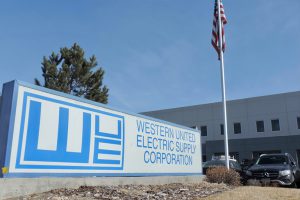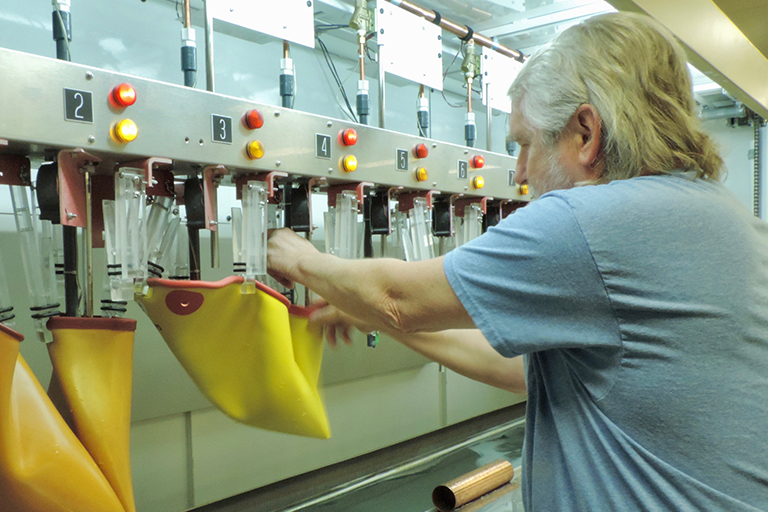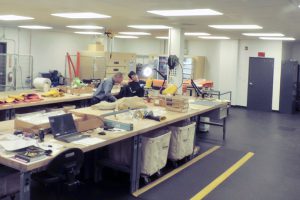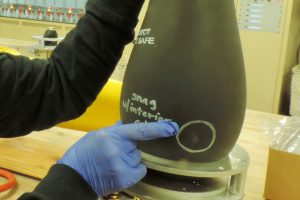By Mary Peck
Every job comes with its own unique tools of the trade. For electric lineworkers, those tools include personal protection equipment (PPE) to keep them safe as they work in what has been listed as one of the top 10 most dangerous jobs in the country.
This PPE includes personally-fitted rubber insulating gloves and sleeves, along with blankets, insulating line hoses, fiberglass hot shot sticks, grounds and jumpers. Keeping this necessary equipment in safe condition, without tears or degradation, means it must be tested regularly. That testing is required by the Occupational Safety and Health Administration, but as Dale Kishbaugh, director of safety and loss control for the Colorado Rural Electric Association, puts it, “It’s the difference between them going home and not going home.”
For years, many of Colorado’s electric coops shipped their lineworkers’ equipment as far away as Kansas and Iowa for regular safety testing. Much of that equipment was purchased from Western United Electric Supply Corporation. Western United was created as an electric materials distribution co-op by Colorado’s electric co-ops in 1976. Today it has 67 member co-ops across eight states with warehouses in Brighton, Colorado; Salem, Utah; and Albuquerque, New Mexico.
Weekly supply shipments are sent to co-ops with materials needed for construction projects and other line work. However, Western United’s semi tractors then returned empty. That led Western United CEO Mike Prom to a realization three years ago: If WUE built a test lab at its main Brighton facility, much of the lineworkers’ personal protection equipment that was being sent across the country for safety testing could come back to WUE on those otherwise empty delivery trucks.
“We saw another opportunity to provide value to our members,” he said.
The idea to build a regional electrical rubber equipment test lab inside WUE’s Brighton building made so much sense that it was quickly accepted by the Western United board and by late 2015, it was up and running.
Within just a few months, the new test lab was busier than anyone expected. Greg Mordini, CFO at Western United, said that additional testing machines had to be purchased within the first year of operation to keep up with demand. “It’s been phenomenal,” he said. “We’re saving members a lot of money on freight, and the growth of the lab exceeded our wildest estimates.”
For Colorado’s co-ops, which test equipment much more frequently than OSHA standards require, having a trusted testing lab in their own state not only means savings and convenience, it also brings new peace of mind. “We’ve gotten a lot of positive feedback,” Kishbaugh said. “Rather than shipping it off to a location they have no idea about, they have a chance to tour the facility, and instead of being a number on a box, there’s actually a name and co-op to go with it. There’s a mutual respect both ways.”
RAISING THE BAR
Western United’s development phase included visits to the highly regarded Cooperative Electric Energy Utility Supply test lab in South Carolina and the Colorado Springs Utilities test lab. It was important to Prom to look carefully at best practices and learn what does and doesn’t work, setting Western United’s lab up for success.
The lab sits in an enclosed area inside Western United’s facility with its own air and humidity control. A full-time lab coordinator and rotating shifts of employees keep testing operations running nine hours a day, five days a week. Shipments of lineworkers’ gloves, sleeves and tools arrive daily. With a total of 80 customer utilities currently, that adds up to approximately 70,000 pieces of protective equipment tested per year in the lab. Prom says a commitment to customer service is key. “People like our two- to three-week turnaround — we focus heavily on this,” he said.
Maintaining the highest possible level of testing efficiency and service requires specific processes and immense attention to detail, including a running track record for each glove tested in the lab. The glove owner’s name, testing dates and condition are all individually documented and the data is stored on Western United’s servers.
The journey of a lineworker’s set of gloves through Western United’s safety testing is a multi-step process. After being washed, disinfected and dried using customized machines and cleaning agents, specially-built AC/DC electric machines with an energized water tank run a series of safety tests. Lab technicians then visually inspect the gloves by hand and place them on inflators to ensure no defects of any kind are present. Finally, the gloves are packaged in heat-sealed plastic for return to the lineworker. Included in that return package is a strong sense of pride from Western United’s lab staff for the work they do. “We test at a higher level than what is required,” Prom said. “That’s your life, that’s your family. It’s critical.”
In cases where a piece of equipment is found to be defective, replacement items can be easily provided from Western United’s extensive stock. “A lot of trust and faith is put in these labs,” Kishbaugh said. “If there’s any question at all, they’ll take that stuff out of service.”
A RESPECTED, GROWING REPUTATION

The Western United Electric Supply Corporation test lab is located inside its corporate office in Brighton.
The Western United test lab recently received the highly respected accreditation certificate from the North America Independent Laboratories (NAIL) for Protective Equipment Testing. A test lab
must be in operation for at least two years and meet rigorous onsite testing standards in order to achieve NAIL accreditation.
“We got a very strong recommendation from them,” Prom said. With Western United’s Colorado test lab now being the only NAIL accredited lab in an 11-state region, it’s certain to attract even more co-ops and municipalities.
With such tremendous growth in its short time of operation, WUE is in the process of adding duplicates for each machine in the lab, so operations will not be affected should one ever need to be taken out of service. WUE is also adding lab technicians to keep up with demand.
In creating a respected regional safety test lab for its members, Western United’s goal of upholding cooperative principle six, “cooperation among cooperatives,” has been quickly realized and thousands of electrical lineworkers across the West are reaping the benefits.
“It’s work and care and effort,” Prom said. “We love showing it off.” To schedule a tour of WUE’s test lab, contact Greg Mordini at gmordini@wue.coop or 720-880-7051.
Mary Peck is a Colorado freelance writer with an extensive background in the electric cooperative industry.



